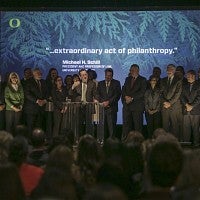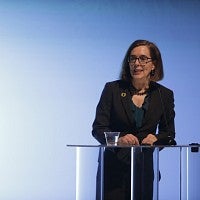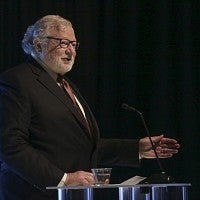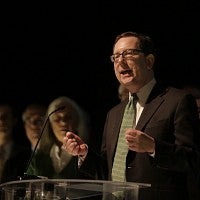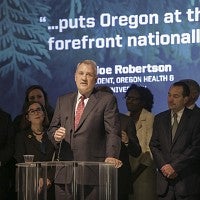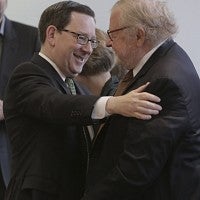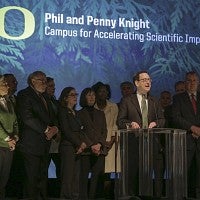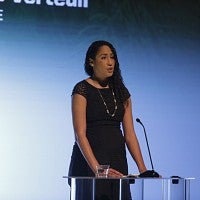Announcing an electrifying shift in the future of the University of Oregon and the state, UO President Michael H. Schill on Tuesday pulled back the curtain on a transformational gift of $500 million from longtime supporters Penny and Phil Knight.
The gift will launch a $1 billion initiative creating the Phil and Penny Knight Campus for Accelerating Scientific Impact. The one-of-a-kind center will be dedicated to the translation of laboratory discoveries into tangible innovations that improve lives and advance society.
KNIGHT CAMPUS BY THE NUMBERS
To be known as the Knight Campus, the initiative will be one of the first public university initiatives to bring researchers together with entrepreneurial specialists for the primary purpose of finding new and transformative ways of turning research into everyday products, technologies and services to aid society at large. The campus will reshape how research is done and build on the UO’s pathbreaking reputation for interdisciplinary science.
“The Knight Campus will reshape the state’s public higher education landscape by training new generations of scientists, forging tighter ties between industry and entrepreneurs, and creating new educational and career opportunities for graduate and undergraduate students,” Schill told a packed ballroom in the Ford Alumni Center. “The Knight Campus will catapult our state’s knowledge-based economy forward. It will generate each year between $80 million and $100 million of economic activity statewide, and it will support between 750 to 1,000 jobs.”
The announcement was made in front of a standing-room-only crowd that included Gov. Kate Brown, Oregon Health & Science University President Dr. Joe Robertson, members of the state Legislature and the UO Board of Trustees, faculty, and students, who all cheered the start of a new era at the UO.
"This investment will help make sure that Oregon moves full steam ahead into the innovation economy of tomorrow," the governor said.
Robertson introduced Schill by saying the gift ushers in a new era.
“I can’t tell you how proud and elated that I am here today,” said Robertson, whose MBA is from the UO. “This is a transformative development that creates a powerful new platform for collaboration and partnership between the scientists and researchers at the University of Oregon, OHSU and other institutions. Today is a great day not only for this university, but for all Oregonians.”
Calling the gift “a monumental act of philanthropy,” Schill said it marks the center point of a history-changing moment for the UO. It is unprecedented in the 157-year life of the university and in the history of the state.
It comes from the UO’s most generous and enthusiastic supporter and his wife, a couple whose gifts had already helped transform the campus and make the University of Oregon a name known across the nation and around the world. To add such a historic and game-changing gift to that kind of legacy is staggering, Schill said.
“This gift is simply extraordinary,” the president said to a standing ovation. “They gave it out of a deep love for our university and the state of Oregon and an abiding belief that, with the right resources, the right strategy and the right leadership, the University of Oregon could achieve a level of excellence and national prominence that has previously been out of reach."
The gift marks the largest donation ever to a single public flagship university. Other gifts of similar size have gone to medical schools, private universities or multi-university partnerships. It is the largest gift ever to any of Oregon’s seven public universities and matches a gift to the semi-public Oregon Health & Science University, also from Penny and Phil Knight.
Unlike the OHSU gift, the Knight Campus gift is not a challenge and does not require any match. But the UO will seek additional donations and state support to double funding for the campus, with some of the money going to construction and hiring and some to an endowment to fund operation of the campus long into the future.
“In an age of declining public support for scientific research generally and declining public higher education support, specifically, Penny and I are delighted to contribute to these critically important areas,” Phil Knight said. “While not without risk, we believe the expected societal returns from such investments are high. And here at home in Oregon, we believe the potential to arm our talented young people with the skills and tools they will need to have a lasting impact on the world and to pursue rewarding careers makes such investments essential.”
The Knight Campus will function in a way similar to an engineering or medical school and will not be a direct part of any of the UO’s existing schools and colleges, although deep collaborations with those campus units will be part of the new initiative’s DNA. The university will soon launch a search for an executive director of the Knight Campus, a role that will be filled in the interim by biology professor Patrick Phillips.
Schill said he and Phillips already are starting outreach to the University Senate Academic Council, the Faculty Advisory Committee and other campus leaders to discuss rollout of the initiative.
When fully built out, the Knight Campus will encompass three buildings approximately 70,000 square feet each. The campus will be located on the north side of Franklin Boulevard, directly across from the university’s existing Lorry Lokey Science Complex, and will be connected to the complex by a sky bridge.
The campus will be outfitted with cutting-edge labs, research facilities, prototyping tools, imaging facilities, human-subject interaction spaces and an innovation hub. Details of the campus project will be worked out over the coming year.
Schill said the idea for the gift originated with UO faculty, who began meeting last fall to brainstorm groundbreaking ideas for taking the university to the next level. The idea that emerged was a science campus designed from the ground up to speed and shorten what researchers call the “impact cycle,” the time it takes to translate laboratory discovery into useful innovations and technologies.
“These scientists and scholars shared their big idea with me, I shared it with Phil and Penny Knight, and they loved it,” Schill said.
While the Knight Campus will be a hub for science, the initiative will have benefits across campus. Schill said he envisions a center where scientists not only work at the cutting edge of discovery but also spark explorations on technology and social change in the humanities and social sciences, and at the intersection of research and law, business, media and more.
But the Knight Campus will send ripples far beyond campus. Schill said it will be an important catalyst for economic development across the state and a chance for Oregon to leap ahead in the innovation economy.
“With Silicon Valley to the south, with Seattle to the north, the time is ripe for this type of economic development,” he said. “I believe that the tailwinds are with us and that the Knight Campus will soon be playing a major role in transforming our economy into one with higher-paying, information-based jobs.”
Schill credited not only the Knights but also the legislators and alumni who helped change the university’s governance structure to pave the way for the gift. And he thanked faculty for their vision, Board of Trustees Chair Chuck Lillis for his leadership and the university’s donors and friends whose gifts laid the groundwork for this transformation.
Lillis said the gift and the ambitious plans for it illustrate the value of having separate boards for the state's public universities. He said that change has made Oregon universities the envy of public institutions nationwide.
"This day is a good example of what it is like to have your own board of trustees," Lillis said, "who focus the university, support it, dream big and set audacious goals."
Schill agreed the day was all that, and more.
“This is a defining moment for the University of Oregon, a bold step forward that will shape the trajectory of this university for the next century and beyond,” the president said. “I am very excited to share it all with you.”
—By Greg Bolt, University Communications



